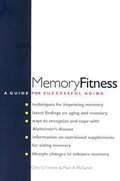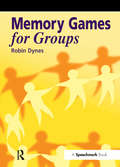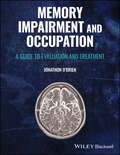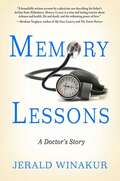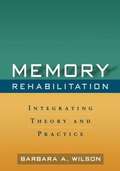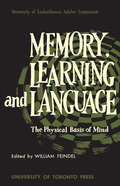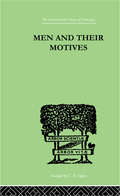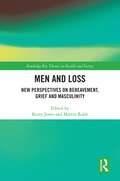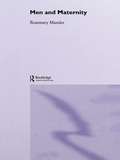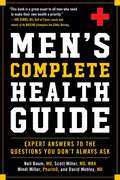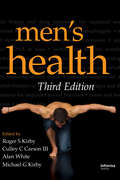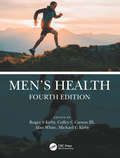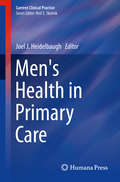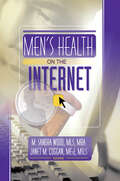- Table View
- List View
Memory Fitness: A Guide for Successful Aging
by Gilles O. Einstein Mark A. McdanielDo all adults experience memory difficulties as they age? What is the difference between normal memory change and the symptoms of Alzheimer's disease? Is it possible to stem--or even reverse--memory decline? This timely book is a comprehensive guide for the growing number of adults who are eager to learn how aging affects memory and what can or cannot be done about it. Gilles Einstein and Mark McDaniel, widely respected for their research and lectures on memory, explain how memory works and how memory processes change with age. Based on up-to-date and rigorous scientific evidence, they also offer *techniques and strategies for improving memory in everyday life *alternatives to hard-to-use mnemonic techniques *physical and mental exercises that can enhance memory *a review of drugs and nutritional supplements touted to enhance memory *a complete discussion of Alzheimer's disease, its symptoms and risk factors, along with guidance for caretakers *and much more. "A clear and scientific evaluation of age-related memory changes and what can be done to minimize them. "--Timothy Salthouse, director, Cognitive Aging Lab, University of Virginia
Memory Games for Groups
by Robin DynesThis wonderfully practical handbook features 80 adaptable and photocopiable games for uses with older people, as well as individuals or groups of all ages. The games can be used as part of a social activities programme, specifically for reminiscence purposes, to help keep people orientated to the world around them, to exercise memory skills or as the prelude to discussion, so that individuals can share difficulties and explore methods of aiding memory.
Memory Impairment and Occupation: A Guide to Evaluation and Treatment
by Jonathon O'BrienMEMORY IMPAIRMENT AND OCCUPATION Apply the latest evidence-based knowledge of human memory in your occupational therapy practice. Memory is among the core components of the human experience. We draw continuously on memory in our everyday lives, facilitating our daily routines and building on our past experiences to improve our future occupational performance. Memory loss impairs human occupation in myriad ways. Memory Impairment and Occupation: A Guide to Evaluation and Treatment is a practical, evidence-based guide that is essential reading for occupational therapists, providing ways forward for those working with memory impaired individuals. There are chapters on concepts of memory, memory development throughout the lifespan, amnesia in traumatic brain injury, dementia and post-traumatic stress disorders, memory impairments in children and adolescents, adults with acquired brain injury, and older people. The book draws on the latest evidence from cognitive neuroscience, while maintaining a consistent focus on the distinct theoretical contributions of occupational therapy and occupational science. Memory Impairment and Occupation: A Guide to Evaluation and Treatment readers will also find: Points for discussion, case studies, activities and simulation activities that can be used in personal study, in-service training, or university tutorials and seminars Lucid outlines of relevant neuroanatomy An innovative ‘memory checklist’ that can be used as part of task analysis when working with people with memory impairments Memory Impairment and Occupation: A Guide to Evaluation and Treatment is ideal for occupational therapy clinicians and students concerned with the assessment and treatment of people with memory impairments. It will also be of interest to physicians, psychologists, speech and language therapists, and all those working with this population.
Memory Lessons: A Doctor's Story
by Jerald WinakurThe story of becoming a doctor, and being a son. Jerald Winakur is a doctor who cares for, and about, the elderly. Dedicated and compassionate, he's a surrogate son to many. And yet, all his years of service helping patients and their families adjust to the challenges of aging did not prepare him for becoming father to his own father, who had become as needy as any child. In Memory Lessons--a tender and provocative book--Dr. Winakur writes about what it's like to be medical counselor to countless patients, while disclosing his personal heartbreak at watching his 86-year-old father descend into disability and dementia, his mother at his side. In both of these roles--highly skilled professional and loving son--he finds he is hard pressed to alter a course that devastates his dad and tears at his family. But he does what he can. A doctor who does his best to listen carefully to each patient in turn, who attempts to confront every problem with, as he says, "a reasonable fund of knowledge, a modicum of common sense, and a large dose of honesty," Dr. Winakur knows that there is much we can do by loving and listening. We all search for answers; we all want to do the right thing for our parents, but few of us know what that right thing is. Faced with caring for a growing sea of elders, Dr. Winakur reflects on his thirty years in the medical profession to consider the very personal and immediate questions asked by families every day: What are we going to do with Dad? Who will care for him--and how? These are urgent questions, and they're faced head-on in Memory Lessons with unflinching honesty, hope, and, above all, love.
Memory Rehabilitation
by Barbara WilsonFrom a well-known authority, this comprehensive yet accessible book shows how state-of-the-art research can be applied to help people with nonprogressive memory disorders improve their functioning and quality of life. Barbara Wilson describes a broad range of interventions, including compensatory aids, learning strategies, and techniques for managing associated anxiety and stress. She reviews the evidence base for each clinical strategy or tool and offers expert guidance on how to assess patients, set treatment goals, develop individualized rehabilitation programs, and conduct memory groups. The book also provides essential background knowledge on the nature and causes of memory impairment.
Memory and Brain Dynamics: Oscillations Integrating Attention, Perception, Learning, and Memory (Conceptual Advances In Brain Research Ser. #Vol. 7)
by Erol BasarMemory itself is inseparable from all other brain functions and involves distributed dynamic neural processes. A wealth of publications in neuroscience literature report that the concerted action of distributed multiple oscillatory processes (EEG oscillations) play a major role in brain functioning. The analysis of function-related brain oscillatio
Memory, Anniversaries and Mental Health in International Historical Perspective: Faith in Reform (Mental Health in Historical Perspective)
by Rob Ellis Jennifer Wallis Rebecca WynterThis book is the first to explore memory, misremembering, forgetting, and anniversaries in the history of psychiatry and mental health. It challenges simplistic representations of the callous nature of mental health care in the past, while at the same time eschewing a celebratory and uncritical marking of anniversaries and individuals. Asking critical questions of the early Whiggish histories of mental health care, the book problematizes the idea of a shared professional and institutional history, and the abiding faith placed in the reform of medicine, administration, and even patients. It contends that much post-1800 legislation drafted to ensure reform, acted to preserve beliefs about the ‘bad old days’ and a ‘brighter future’ in the state memories of imperial powers, which in turn exported these notions around the world. Conversely, the collection demonstrates the variety of remembering and forgetting, building on recent interest in the ideological and cultural linkages between past and present in international psychiatric practice. In this way, it seeks to trace the pathways of memory, exploring the direction of travel, and the perpetuation, remodeling, and uprooting of recollection.Chapter “The New Socialist Citizen and ‘Forgetting’ Authoritarianism: Psychiatry, Psychoanalysis, and Revolution in Socialist Yugoslavia” is available open access under a Creative Commons Attribution 4.0 International License via link.springer. com.
Memory, Learning and Language: The Physical Basis
by William FeindelThe symposium was arranged with the purpose of cutting across some of the lines dividing various disciplines all having a common interest in different aspects of the functioning of the brain. The essays, given originally as lectures at one of the Jubilee celebrations of the University of Saskatchewan, were deliberately designed to be of interest to laymen concerned with the problem of education as well as to academics dealing daily with products of the brain's activity in teaching and learning. One of the main themes of the book is that the human brain has far greater potentialities than our present methods of education are exploiting; another is that, although our universities can be said to owe their very existence to the multiplex activities of the human mind, the subject of how the brain functions and the application of even our rather meagre knowledge of this field to the sphere of teaching and learning remains greatly neglected in university programmes. The subject of brain function, studied daily by the neurologist and neuro-surgeon, should gain the interest of non-medical fields concerned with utilizing the mechanism of the mind.
Men And Their Motives: PSYCHO-ANALYTICAL STUDIES
by Flugel, J CFirst published in 1999. Routledge is an imprint of Taylor & Francis, an informa company.
Men Who Sell Sex: Global Perspectives (Sexuality, Culture and Health)
by Richard Parker Peter AggletonAll over the world, men as well as women exchange sex for money and other forms of reward, sometimes with other men and sometimes with women. In contrast to female prostitution, however, relatively little is known about male sex work, leaving questions unanswered about the individuals involved: their identities and self-understandings, the practices concerned, and the contexts in which they take place. This book updates the ground-breaking 1998 volume of the same name with an entirely new selection of chapters exploring health, social, political, economic and human rights issues in relation to men who sell sex. Looking at Europe, North America, Latin America and the Caribbean, Africa and the Asia-Pacific, each chapter explores questions such as: What is known about the different ways in which men exchange sex for money or other forms of reward? What are the major contexts in which sexual exchange takes place? What meanings do such practices carry for the different partners involved? What are the health and other implications of contemporary forms of male sex work? Men Who Sell Sex seeks to push the boundaries both of current personal and social understandings and the practices to which these give rise. It is an important reference work for academics and researchers interested in sex work and men’s health including those working in public health, sociology, social work, anthropology, human geography and development studies.
Men Who Sell Sex: International Perspectives on Male Prostitution and HIV/AIDS (Social Aspects of AIDS)
by Peter AggletonMen Who Sell Sex is the first comprehensive international account of male prostitution and AIDS. While much is known about female prostitution and sex work, relatively little is known about men who sell sex - either to women or other men. This book brings together an authoritative collection of essays from different countries and examines sexual behaviour, the reasons men sell sex, the meanings involved, and implications for HIV prevention. The authors are all experts in their fields and individual chapters offer a compelling description of the reasons men sell sex and the pleasures and risks involved.
Men and Loss: New Perspectives on Bereavement, Grief and Masculinity (Routledge Key Themes in Health and Society)
by Martin Robb Kerry JonesThis important book draws together new research and theories about bereavement, on the one hand, and men and masculinities on the other, to increase our understanding of men’s experience of loss and contribute towards improving support services for men following bereavement.Bereavement and loss are unavoidable events in life and can be challenging experiences for anyone, regardless of gender. However, in contemporary western cultures, men’s experience of bereavement continues to be framed by socially constructed ideas surrounding masculinity, which dictate that men must be stoic following a loss, with grief manifesting in either anger or despair. Men who do not grieve in accepted ‘masculine’ ways can feel judged, alienated or disenfranchised. This interdisciplinary and interprofessional collection presents theoretical analysis, reports of research findings, reviews of support and interventions, and a wealth of personal accounts. It includes chapters discussing partner loss, childhood bereavement, perinatal loss and bereavement through suicide, as well as bereavement at all stages of the life course.Men and Loss is an essential read for advanced students and researchers with an interest in men’s health and bereavement studies from a range of disciplinary backgrounds, including nursing, medicine, counselling, sociology, social work and psychology.
Men and Maternity
by Rosemary ManderSince the development of modern medicine, men have become increasingly involved in childbearing as obstetricians and, more recently, as fathers. This book argues that the beneficial contribution of men has been taken for granted. Certain changes to childbearing practice have resulted, which, together with men's involvement, have been encouraged without any reference to evidence and without adequate opportunity for reflection.Considering the findings of recent research and wider literature, and using qualitative research with mothers the text examines:· how men became increasingly involved in childbearing · the medicalisation of childbirth · the difficulties men experience with childbirth as fathers · challenging situations, such as fathers' grief· the taken-for-granted assumptions that men’s increased contribution to childbearing is beneficialThis text will be of great interest to academics and postgraduate students of midwifery, obstetrics, medicine and health studies, as well as practising midwives and obstetricians, health visitors, childbirth educators and labor and delivery room nurses.
Men and the War on Obesity: A Sociological Study
by Lee F. MonaghanIs obesity really a public health problem and what does the construction of obesity as a health problem mean for men? According to official statistics, the majority of men in nations such as England and the USA are overweight or obese. Public health officials, researchers, governments and various agencies are alarmed and have issued dire warnings about a global ‘obesity epidemic’. This perceived threat to public health seemingly legitimates declarations of war against what one US Surgeon General called ‘the terror within’. Yet, little is known about weight-related issues among everyday men in this context of symbolic or communicated violence. Men and the War on Obesity is an original, timely and controversial study. Using observations from a mixed-sex slimming club, interviews with men whom medicine might label overweight or obese and other sources, this study urges a rethink of weight or fat as a public health issue and sometimes private trouble. Recognizing the sociological wisdom that things are not as they seem, it challenges obesity warmongering and the many battles it mandates or incites. This important book could therefore help to change current thinking and practices not only in relation to men but also women and children who are defined as overweight, obese or too fat. It will be of interest to students and researchers of gender and the body within sociology, gender studies and cultural studies as well as public health researchers, policymakers and practitioners.
Men of Action (Exploded Views)
by Howard AklerThe problem of consciousness may just be a semantic one. The brain absorbs a sea of sensory input, the tiniest fraction of which reaches the shore of our awareness. We pay attention to what is most novel, most necessary at the time. At its most reductive, the word 'consciousness' refers to the synchronized firing of neurons across multiple areas of the brain, the mental experience of attending. But should consciousness be summed up simply by its subsconscious mechanism? I would prefer a more imaginative answer. After his father, Saul, undergoes brain surgery and slips into a coma, Howard Akler begins to reflect on Saul's life, the complicated texture of consciousness, and Akler's struggles with writing and his own unpredictable mind. With echoes of Paul Auster's The Invention of Solitude and Philip Roth's Patrimony, Men of Action treads the line between memoir and meditation, and is at once elegiac, spare, and profoundly intimate.
Men's Complete Health Guide: Expert Answers to the Questions Men Don't Always Ask
by Scott Miller Neil Baum David Mobley Mindi Miller"This book is a great asset to all men who need to make their own health a priority." --Joe Gibbs, NFL Hall of Fame coach and owner of 4x NASCAR champion Joe Gibbs Racing Everything you need to know about men&’s health in one handy package—updated, revised, and expanded. The authors&’ first edition (2018) concentrated on the male pelvis and health concerns &“down there.&” Urologists Neil Baum and Scott Miller described the male pelvic region and its complex functions before moving on to a comprehensive list of related medical concerns, including pelvic pain, prostate problems, urinary leakage, urinary tract infections, testosterone deficiency, STDs, prostate cancer, and questions about infertility and sexual dysfunction. Both authors approached these very personal and sensitive topics with straightforward, reader-friendly language, using case examples, illustrations, research, and occasional humor to explain the potential causes and cures for each medical challenge. Five years later, the authorship has been doubled to include one more urologist, David Mobley, and a Doctor of Pharmacy, Mindi Miller. With this expanded team of experts, the goal is to provide men with health information—not only from prostate to penis—but from head to toe. Nine totally new chapters address a wide range of topics that altogether equip the reader with key information to assess and improve his mental, physical, and emotional health. The authors even provide step-by-step processes to use when selecting a doctor or surgeon, and what signs might indicate that a doctor&’s visit is a must. Men&’s Complete Health Guide means that men no longer need to suffer in silence or dwell in denial. This valuable resource enables every man to become his own health advocate, more likely to discuss body concerns with family or friends, and more open to seeking a doctor&’s advice for remedy.
Men's Health
by Alan White Culley C Carson Roger S Kirby Michael G KirbyThis Third Edition of Men's Health provides a comprehensive and authoritative reference source to urologists, andrologists, family practitioners, and all professionals dealing with the male patient who diagnose and treat males with a variety of health problems, such as prostate cancer, male osteoporosis, and testicular cancer. The new edition been
Men's Health
by Peter H. C. Lim S S Vasan Fahim L. H. RajiwateMen's Health is intended for the novice medical practitioner explaining topics that clinicians regularly encounter, giving a clear, concise, no-nonsense instructional book. It ranges from hormone therapy to other aspects of sexual medicine and andrology, such as Testosterone Deficiency Syndrome; Premature Ejaculation and Sexually Transmitted Infections (STIs), in the field of Men's Health and guides the reader in both evaluation and management. For the more experienced practitioner there is a wealth of information he can well benefit from as the authors cover some less commonly known aspects of the field of men's health that can only be appreciated after many years in this area of clinical medical practice. Written by experts in the field, Men's Health is a valuable and timely resource for urologists, andrologists, endocrinologists as well as other health professionals practicing in these areas.
Men's Health
by Peter H. LimMen's Health is a concise, didactic compendium that covers three important aspects of male sexual health:- Testosterone Deficiency Syndrome; Premature Ejaculation and Sexually Transmitted Infections (STIs). The chapters that deal with Testosterone Deficiency Syndrome cover the epidemiology of the condition in the local context, the science behind the condition, its clinical presentation and treatment choices. The section on Premature Ejaculation advises the health practitioner on how to investigate this condition and describes the various treatment options available to the patient. The chapters on Sexually Transmitted Infections cover special aspects of the diagnosis, prevention and treatment of STIs occurring in Men which are not normally highlighted in the usual texts on STI management. Written by experts in the field, Men's Health is a valuable and timely resource for urologists, andrologists, endocrinologists as well as other health professionals practicing in these areas.
Men's Health 4e: How To Do It
by Alan White Roger Kirby Mike Kirby Culley C CarsonSince its first edition, Men's Health has established itself as the essential reference for practitioners across the spectrum of medicine - including those working in urology, andrology, cardiology, endocrinology, family practice and mental health. For this fully updated fourth edition the editors have again assembled an international team of expert authors to write on an encyclopedic range of topics, making this an invaluable resource for any health professional interested in maintaining and improving the health of their male patients. Comprehensive coverage of every aspect of men's health and the gender gap. Includes the latest research on cardiovascular risks. Assesses the specific issues concerning men and cancer. Examines the often overlooked aspects of mental health as it affects men. Incorporates new developments in metabolic medicine and men.
Men's Health in Primary Care
by Joel J. HeidelbaughThis book fills a major gap in the literature by providing comprehensive guidelines for the care of male patients through the lifecycle and across healthcare settings. Devoted solely to improving men's health, this book serves as an accessible, practical reference for clinicians treating these patients. It focuses on the psychosocial challenges that men encounter in obtaining healthcare as well as acute and chronic medical and psychological diseases. The book also offers current evidence-based guidelines for wellness and health maintenance. Topics include the problem of help seeking, preventative services, sexual dysfunction, cardiovascular health, prostate cancer screening, and testosterone deficiency. Men's Health in Primary Care is a valuable resource for primary care clinicians and students in family medicine, internal medicine, and adolescent medicine.
Men's Health on the Internet
by Janet M CogganThe best health resources for men on the Net!Men's Health on the Internet puts the best of what the Web has to offer on the subject into one handy volume. Use it as a guide to the best Web sites representing men's health organizations, reliable sites where you can find current health news for men, and much more! This important book evaluates Web sites for content, clarity, and user-friendliness, and shows you how to conduct a focused, subject-specific search.From editor M. Sandra Wood: “It is well known that men are less likely than women to seek health care. Men tend to wait as long as possible to see a doctor about a health problem, making early diagnosis difficult if not impossible. Given the fact that men seem to be more private about their illnesses, the Internet provides an excellent place for them to seek health care information.”Men's Health on the Internet: examines what men need and expect as health care consumers provides an overview of the resources available on the World Wide Web teaches you about search engines and how to use them to find what you're looking for quickly and efficiently points you toward information on cancer--Web-based resources on risk factors, early detection, and treatment brings you reliable resources for information on prostate problems puts you in touch with reliable information men's concerns, including hair loss, high blood pressure (hypertension), heart health, infertility/impotence, and physical fitness includes resources for gay men's health issues increases your awareness of different types of Internet resources, including mailing lists, newsgroups, and real-time communication Information resources on the Internet relating to health issues, from Web sites to newsletters to chat groups, are abundant. Some are much more reliable than others, and there is just as much variety when it comes to ease of use. Take control--use Men's Health on the Internet to sift through the often overwhelming number of related sites to find the information you need!
Men's Health: How to Do it
by Alan White David ConradThis work includes Foreword by Ian Banks - President, Men's Health Forum. Traditionally, men have been seen as reluctant to access health services, but getting men to engage with their health isn't an impossible task once you're equipped with a few tricks of the trade. This concise, easy to read guide offers a no-nonsense, practical approach to the development and implementation of men's health programmes. Based on years of wide-ranging experience, the book is designed for anyone who is involved in service delivery for men and boys, and demonstrates what can be achieved with adequate resources, a flexible approach and a sound understanding of men's needs. It is ideal for all healthcare professionals and managers, and medicine and nursing students undertaking specialist men's health and health promotion courses. It is also of great interest to teachers and youth leaders, including school nurses. Healthcare policy makers and shapers will find it enlightening reading. 'This book is for anyone who wants to find out how to successfully set up and deliver health services aimed at men and boys. Traditionally, men have been seen as reluctant to access health services, but getting men to engage with their health isn't an impossible task once you're equipped with a few tricks of the trade. Although this is primarily intended to be a practical guide, much of the book will also be of interest to academics, policy makers and managers. It demonstrates what can be achieved with adequate resources, a flexible approach and a sound understanding of men's needs.' - David Conrad and Alan White, in the Preface. 'As an issue men's health is plagued by myth, ignorance and inequality, but most of all by a lack of solid research based on evidence-based work with men themselves. Lofty academics pontificate endlessly on the meaning of 'masculinity' yet never get their invariably white Caucasian, middle class hands dirty on what really impacts on Y chromosome owners. The Bradford team didn't just wonder about masculinity and scratch male pattern baldness, they did something measurable about men's health and ethnicity so other workers could use their evidence base to actually change the dreadful health status quo. An excellent and unique "Dirty Hands Manual".' - Ian Banks, in the Foreword.
Men's Sexual Health and Fertility
by John P. Mulhall Wayland HsiaoIn the last decade, much of the clinical interest in the field of infertility has focused on advancing reproductive techniques and has often under-appreciated the role that male sexuality plays in reproductive problems. Male sexual function is an integral part of reproduction, and the treatment of sexual dysfunction is an important component for any couple seeking fertility. In some cases, treatment of sexual dysfunction may obviate the need for more invasive cures through advanced reproductive techniques. Thanks to recent clinical and scientific advances in male sexual medicine, the management of men's sexual dysfunction is often more effective and less invasive than how it was historically described. Men's Sexual Health and Fertility is the only resource that focuses on the interplay and interconnections between male sexual dysfunction and male factor infertility, gathering insightful data from a panel of experts in male sexual medicine for clinicians who treat couples with fertility issues due to male sexual dysfunction. Chapters discuss advances in the field of men's sexual medicine, including the latest treatment for erectile dysfunction, the most up-to-date understanding of the physiology and pathophysiology of ejaculation, and the growing body of evidence that low testosterone and male infertility are intimately related. As such, this book provides important information in order to be able to better understand the link between sexual dysfunction and infertility and, most importantly, to better treat male sexual dysfunction in the infertile couple.
Men, Gender Divisions and Welfare
by Jeanette Edwards Jeff Hearn Jennie PopayFirst published in 1998. Routledge is an imprint of Taylor & Francis, an informa company.
